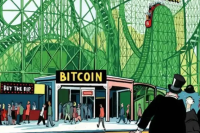The revenge tragedy at the London Stock Exchange whose plot I outlined last month has reached its third act, but the carnage may not be over. Chief executive Xavier Rolet has left the building, rather than staying one more year as the LSE first announced, and declared that he won’t come back under any circumstances. Despite whispers that ‘aspects of his operating style’ sparked this row in the first place, Rolet is due a £13 million golden farewell — which the Daily Mail called ‘obscene’ but his fans see as fair reward for all the value he has delivered.
Chief among those fans is LSE shareholder and hedge-fund princeling Sir Chris Hohn, who agitated for Rolet to stay and LSE chairman Donald Brydon to go. So far Hohn has achieved precisely the opposite. Brydon has agreed to retire, but not until April 2019, when he will be almost 74 and surely (even for a man apparently hewn from Scottish granite) ready to ease back. Hohn still wields a dagger, however, and will aim it between Brydon’s shoulderblades at a shareholders’ meeting later this month. Meanwhile, City punters eager to spot Rolet’s successor are putting bets on ex-JPMorgan banker Blythe Masters, famed (though not seriously blamed) for developing the credit derivatives that created such global havoc a decade ago.
One way or another, the planets are still misaligned in this saga of clashing egos and skulking assassins that has embarrassed the City at a time when — as the raised eyebrows of Governor Carney communicated last week — it most needs to give a positive presentation of itself to the world. There was another timely reminder of what’s at stake in the engineering multinational Siemens’s decision to float its medical business Healthineers in Frankfurt rather than New York or London, delivering a sideswipe about Brexit in the announcement by Siemens’s director Michael Sen. He would do, wouldn’t he, you’re thinking: he’s German and so is his company. But Siemens also has 13 UK factories and a long history here, and there was a time when London would have been an obvious contender for such a high-profile listing. Not now it isn’t — and certainly not while the LSE’s ‘Welcome’ mat is splattered with blood.
Trump’s bull market
‘With the great vote on Cutting Taxes, this could be a big day for the stock market — and YOU!’ tweeted Donald Trump on Monday morning, after the Senate joined the House of Representatives in supporting the tax-reform agenda which looks likely to give him a legislative victory at last. The market wasn’t as euphoric as he may have hoped, with the Dow Jones index rising only 0.8 per cent on the day and the tech-dominated Nasdaq actually falling. But if he achieves his proposed cut in corporation tax from 35 to 20 per cent — the most sensible piece of the package, the rest being largely unaffordable giveaways to the rich, including extra relief for estates and private jets — share prices will surely take another leap.
And Trump will hail that as a ringing endorsement for himself, however low his real approval rating among voters. When the inevitable (and according to many pundits, already overdue) stock-market correction kicks in, he’ll just find other narcissistic ways to praise himself.
Madder by the day
I don’t know which is more worrying: that the bitcoin market becomes madder by the day, or that it becomes more mainstream. The market price of a unit of the cryptocurrency has spiked above $11,800, up from $750 a year ago, for no reason other than speculative fever. The total value of bitcoins in existence (if that’s the right word) has surpassed the GDP of New Zealand. The first bitcoin billionaires have been announced as Tyler and Cameron Winklevoss, the American twins who were in at the birth of Facebook. The Chicago Mercantile Exchange is about to launch its first bitcoin futures contract and an analyst at JPMorgan says bitcoin could soon rival gold as a safe-haven holding. What started as a virtual mystery story is fast becoming part of global financial furniture while regulators, central banks and Wall Street bosses watch, warn and try to work out what the real-world impacts will be if bitcoin self-combusts.
Which I continue to believe that it will, though I have not had an opportunity to test my scepticism in debate against, for example, someone who has sold bitcoins for dollars or pounds close to the current peak — unlike the Winklevoss duo, who haven’t sold and whose billion is entirely notional. I note that the most avid bitcoin traders these days are in Japan, where there’s a common personality type who in earlier eras gambled obsessively on gangster-owned pachinko slot-machines. But the only true believers in the cryptocurrency concept I’ve actually met (as opposed to those who just fancy a flutter on a rising market) tend to be rich wacko west-coast Americans who also believe that nation states and their monetary constructs are an outdated notion, overtaken by the potentialities of the internet.
Their view is that state-backed ‘real’ money no longer reliably performs as a store of value and means of exchange because it is undermined by inflation and bad government — and only performs at all because users choose to trust the system. So that makes it no different from money tokens in virtual-world computer games, out of which cryptocurrencies took wing. Except that (as I wrote in a review of a tiresome book on this theme called Wildcat Currency by Edward Castronova) ‘every normal person above the age of six and not over-affected by chemical stimulants should be capable of distinguishing between the real and the imaginary’. We recognise Monopoly money, but when the game ends its ‘value’ evaporates — and that’s what I think will happen, sooner or later, to bitcoin; most likely with colossal elements of fraud. My advice, if you’re in it, is to take your profits while you can and look for the next game to play.







Comments